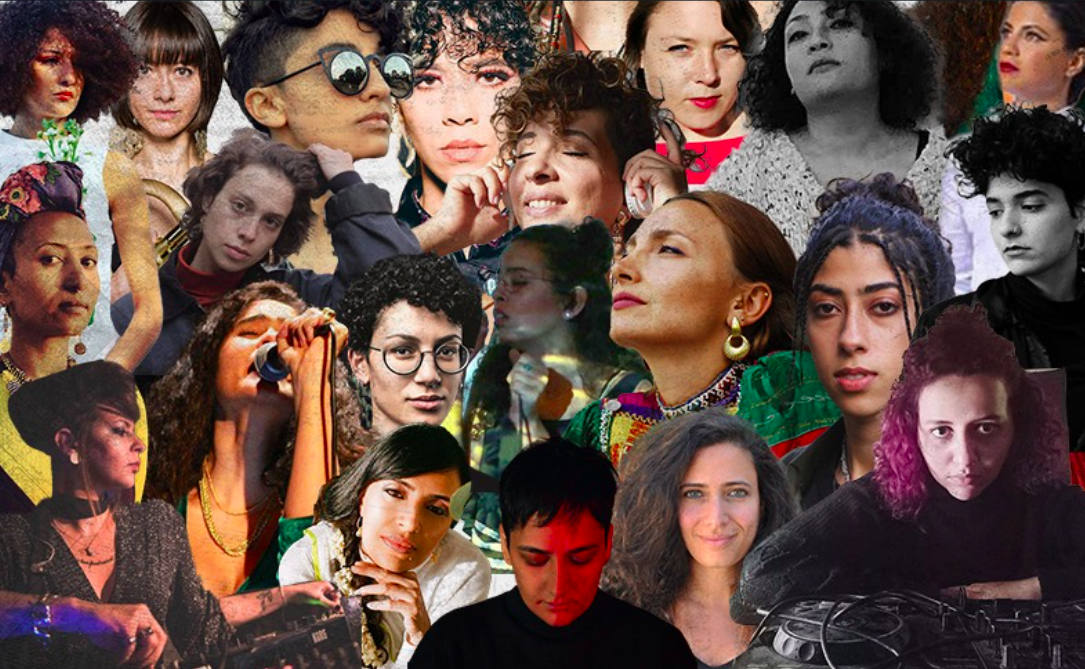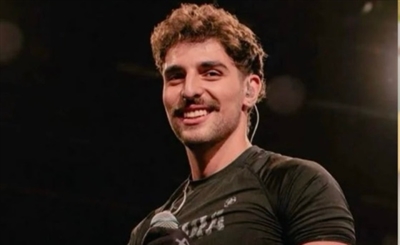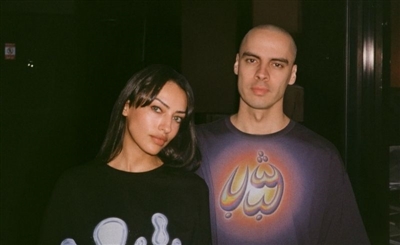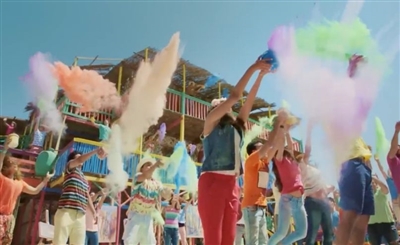An Act of Radical Solidarity: Hiya Live - The Online Festival Celebrating Revolutionary Female Artists
Unprecedented. Unparalleled. Extraordinary. SceneNoise is partnering with Hiya Live - an epic two-day digital festival looking to do more than just make a statement. Gathering some of the most trailblazing and unique female artists from SWANA, it’s out to make a change, as we found out from relentless organisers, Natalie Shooter and Shirine Saad.

I’ve been in and around the Middle Eastern music industry and nightlife scene for the best part of a decade, both behind and in front of the booth, as an artist and promoter, an organiser and a journalist. In all that time I have never been inundated with missed calls from my parents as to my whereabouts after midnight, nor for that matter did they ever question the respectability of one of these occupations (although come to think of it, I kind of wish they had, two-day benders following a gig wearing a panda hat is not very becoming). In all that time I’ve never had a booker touch me inappropriately before getting on to the decks, I’ve never had another artist mansplain where the wires should go (also would have been quite useful for me to be fair), I’ve never been booked because of a gender ratio to make the organisers feel more woke, nor has my sex ever prefixed my name on any description. Of course this is all because I have a certain appendage which acts as the keys to a certain privilege that most men in the industry are only vaguely aware they possess over women. It is a subtle, and oftentimes not so subtle, blanket of sexism, discrimination, harassment, oppression and condescendingness that to this day runs rampant across the region’s dancefloors, stages and behind the scenes.
The Arab world has a rich history of powerful women in music, but for every Umm Kalthoum or Asmahan, iconic and revolutionary voices of their generation revered for their art, there are more than a few Haifa Wehbes in the tapestry, charictural pop archetypes of the male Arab sexual fantasy. The Arab world, of course, also has a rich history of revolution and as with most uprisings, there is an underlining score, a playlist to the revolt that acts as both catalyst and commentator. More often than not, it’s women behind that score, and this intersection between gender, politics and music was the seed for an academic project that became a podcast that will now become an unprecedented two-day online festival. Set to take place between March 13th and 14th, Hiya (Her) Live marks the tenth year anniversary of the Arab Spring as well as Women’s History Month and brings together an all female line-up of revolutionary, progressive DJs, musicians, singers, poets and artists from across the SWANA (South West Asia and North Africa) region who are shaping the future of music.
“There's a very specific energy right now of women wanting to be seen and wanting to be heard and who don't want to be controlled in any way or form."
This festival is, as co-organiser, Hiya podcast founder and host, Shirine Saad puts it, “a rebellious act of solidarity”. It is in part “a rejection of the music industry and a rejection of various kinds of boxes that the industry tries to often put women in,” according to Natalie Shooter, the other organiser leading this musical coup. The two have a long history in the Middle Eastern music scene too, both as journalists, DJs and organisers. British-born Shooter moved to Beirut in 2010 and co-runs one of Lebanon’s most loved DIY club nights, The Beirut Groove Collective, has written about music for a whole host of regional and international publications and recently began monthly residencies for Radio Al Hara and Totally Wired Radio. New York-based Lebanese Saad contributes to the likes of Nowness and The New York Times, is the author of BOHO BEIRUT: A Guide to the Middle East’s Most Sophisticated City, an ode to the creative pulse of her hometown, and is currently the interim programming director of National Sawdust, a NYC-based contemporary arts institution, whilst continuing to map the stories of revolutionary female artists through her podcast. Their friendship and creative partnership blossomed almost ten years ago and Hiya Live was the natural next step in both their careers, an elevation of their mission to support female underground musicians.
Hiya Live Organizers Shirine Saad & Natalie Shooter
Who Run the world!? Err... Still Men, Unfortunately.
All the women on the line-up are connected by what Saad describes as a ‘shared trauma’. It’s a trauma that’s not only triggered from the long list of political horrors that have plagued the region in recent years, including but not limited to military dictatorships, governmental corruption, apocalyptic explosions, ethnic cleansing, unwarrented arrests and rapist leniancy but simply (not so simply) from being women in a male led industry; being told what to wear, how to perform and where to work. “We weren't welcomed in the clubs because the clubs were run by toxic male managers,” Saad recalls., “It’s a toxic atmosphere that was often very abusive of women and also women's bodies. So this movement of revolt that we're noticing is a movement that is not only anti patriarchal, but also anti industry.” With the development of online channels for education and communication, Saad believes that the tide is slowly changing. Whereas in the past female artists would require a man to record the music, a man to design the artwork, a man to promote the releases, now all the tools are available to learn solo whilst putting a middle finger up to the man. “There's a very specific energy right now of women wanting to be seen and wanting to be heard and who don't want to be controlled in any way or form,” retorts Saad. “We're trying to create a safe space where you can be in the public eye and feel free to express yourself.”
<blockquote class="instagram-media" data-instgrm-permalink="https://www.instagram.com/p/CLeXzfDnF9-/?utm_source=ig_embed&utm_campaign=loading" data-instgrm-version="13" style=" background:#FFF; border:0; border-radius:3px; box-shadow:0 0 1px 0 rgba(0,0,0,0.5),0 1px 10px 0 rgba(0,0,0,0.15); margin: 1px; max-width:540px; min-width:326px; padding:0; width:99.375%; width:-webkit-calc(100% - 2px); width:calc(100% - 2px);"><div style="padding:16px;"> <a href="https://www.instagram.com/p/CLeXzfDnF9-/?utm_source=ig_embed&utm_campaign=loading" style=" background:#FFFFFF; line-height:0; padding:0 0; text-align:center; text-decoration:none; width:100%;" target="_blank"> <div style=" display: flex; flex-direction: row; align-items: center;"> <div style="background-color: #F4F4F4; border-radius: 50%; flex-grow: 0; height: 40px; margin-right: 14px; width: 40px;"></div> <div style="display: flex; flex-direction: column; flex-grow: 1; justify-content: center;"> <div style=" background-color: #F4F4F4; border-radius: 4px; flex-grow: 0; height: 14px; margin-bottom: 6px; width: 100px;"></div> <div style=" background-color: #F4F4F4; border-radius: 4px; flex-grow: 0; height: 14px; width: 60px;"></div></div></div><div style="padding: 19% 0;"></div> <div style="display:block; height:50px; margin:0 auto 12px; width:50px;"><svg width="50px" height="50px" viewBox="0 0 60 60" version="1.1" xmlns="https://www.w3.org/2000/svg" xmlns:xlink="https://www.w3.org/1999/xlink"><g stroke="none" stroke-width="1" fill="none" fill-rule="evenodd"><g transform="translate(-511.000000, -20.000000)" fill="#000000"><g><path d="M556.869,30.41 C554.814,30.41 553.148,32.076 553.148,34.131 C553.148,36.186 554.814,37.852 556.869,37.852 C558.924,37.852 560.59,36.186 560.59,34.131 C560.59,32.076 558.924,30.41 556.869,30.41 M541,60.657 C535.114,60.657 530.342,55.887 530.342,50 C530.342,44.114 535.114,39.342 541,39.342 C546.887,39.342 551.658,44.114 551.658,50 C551.658,55.887 546.887,60.657 541,60.657 M541,33.886 C532.1,33.886 524.886,41.1 524.886,50 C524.886,58.899 532.1,66.113 541,66.113 C549.9,66.113 557.115,58.899 557.115,50 C557.115,41.1 549.9,33.886 541,33.886 M565.378,62.101 C565.244,65.022 564.756,66.606 564.346,67.663 C563.803,69.06 563.154,70.057 562.106,71.106 C561.058,72.155 560.06,72.803 558.662,73.347 C557.607,73.757 556.021,74.244 553.102,74.378 C549.944,74.521 548.997,74.552 541,74.552 C533.003,74.552 532.056,74.521 528.898,74.378 C525.979,74.244 524.393,73.757 523.338,73.347 C521.94,72.803 520.942,72.155 519.894,71.106 C518.846,70.057 518.197,69.06 517.654,67.663 C517.244,66.606 516.755,65.022 516.623,62.101 C516.479,58.943 516.448,57.996 516.448,50 C516.448,42.003 516.479,41.056 516.623,37.899 C516.755,34.978 517.244,33.391 517.654,32.338 C518.197,30.938 518.846,29.942 519.894,28.894 C520.942,27.846 521.94,27.196 523.338,26.654 C524.393,26.244 525.979,25.756 528.898,25.623 C532.057,25.479 533.004,25.448 541,25.448 C548.997,25.448 549.943,25.479 553.102,25.623 C556.021,25.756 557.607,26.244 558.662,26.654 C560.06,27.196 561.058,27.846 562.106,28.894 C563.154,29.942 563.803,30.938 564.346,32.338 C564.756,33.391 565.244,34.978 565.378,37.899 C565.522,41.056 565.552,42.003 565.552,50 C565.552,57.996 565.522,58.943 565.378,62.101 M570.82,37.631 C570.674,34.438 570.167,32.258 569.425,30.349 C568.659,28.377 567.633,26.702 565.965,25.035 C564.297,23.368 562.623,22.342 560.652,21.575 C558.743,20.834 556.562,20.326 553.369,20.18 C550.169,20.033 549.148,20 541,20 C532.853,20 531.831,20.033 528.631,20.18 C525.438,20.326 523.257,20.834 521.349,21.575 C519.376,22.342 517.703,23.368 516.035,25.035 C514.368,26.702 513.342,28.377 512.574,30.349 C511.834,32.258 511.326,34.438 511.181,37.631 C511.035,40.831 511,41.851 511,50 C511,58.147 511.035,59.17 511.181,62.369 C511.326,65.562 511.834,67.743 512.574,69.651 C513.342,71.625 514.368,73.296 516.035,74.965 C517.703,76.634 519.376,77.658 521.349,78.425 C523.257,79.167 525.438,79.673 528.631,79.82 C531.831,79.965 532.853,80.001 541,80.001 C549.148,80.001 550.169,79.965 553.369,79.82 C556.562,79.673 558.743,79.167 560.652,78.425 C562.623,77.658 564.297,76.634 565.965,74.965 C567.633,73.296 568.659,71.625 569.425,69.651 C570.167,67.743 570.674,65.562 570.82,62.369 C570.966,59.17 571,58.147 571,50 C571,41.851 570.966,40.831 570.82,37.631"></path></g></g></g></svg></div><div style="padding-top: 8px;"> <div style=" color:#3897f0; font-family:Arial,sans-serif; font-size:14px; font-style:normal; font-weight:550; line-height:18px;"> View this post on Instagram</div></div><div style="padding: 12.5% 0;"></div> <div style="display: flex; flex-direction: row; margin-bottom: 14px; align-items: center;"><div> <div style="background-color: #F4F4F4; border-radius: 50%; height: 12.5px; width: 12.5px; transform: translateX(0px) translateY(7px);"></div> <div style="background-color: #F4F4F4; height: 12.5px; transform: rotate(-45deg) translateX(3px) translateY(1px); width: 12.5px; flex-grow: 0; margin-right: 14px; margin-left: 2px;"></div> <div style="background-color: #F4F4F4; border-radius: 50%; height: 12.5px; width: 12.5px; transform: translateX(9px) translateY(-18px);"></div></div><div style="margin-left: 8px;"> <div style=" background-color: #F4F4F4; border-radius: 50%; flex-grow: 0; height: 20px; width: 20px;"></div> <div style=" width: 0; height: 0; border-top: 2px solid transparent; border-left: 6px solid #f4f4f4; border-bottom: 2px solid transparent; transform: translateX(16px) translateY(-4px) rotate(30deg)"></div></div><div style="margin-left: auto;"> <div style=" width: 0px; border-top: 8px solid #F4F4F4; border-right: 8px solid transparent; transform: translateY(16px);"></div> <div style=" background-color: #F4F4F4; flex-grow: 0; height: 12px; width: 16px; transform: translateY(-4px);"></div> <div style=" width: 0; height: 0; border-top: 8px solid #F4F4F4; border-left: 8px solid transparent; transform: translateY(-4px) translateX(8px);"></div></div></div> <div style="display: flex; flex-direction: column; flex-grow: 1; justify-content: center; margin-bottom: 24px;"> <div style=" background-color: #F4F4F4; border-radius: 4px; flex-grow: 0; height: 14px; margin-bottom: 6px; width: 224px;"></div> <div style=" background-color: #F4F4F4; border-radius: 4px; flex-grow: 0; height: 14px; width: 144px;"></div></div></a><p style=" color:#c9c8cd; font-family:Arial,sans-serif; font-size:14px; line-height:17px; margin-bottom:0; margin-top:8px; overflow:hidden; padding:8px 0 7px; text-align:center; text-overflow:ellipsis; white-space:nowrap;"><a href="https://www.instagram.com/p/CLeXzfDnF9-/?utm_source=ig_embed&utm_campaign=loading" style=" color:#c9c8cd; font-family:Arial,sans-serif; font-size:14px; font-style:normal; font-weight:normal; line-height:17px; text-decoration:none;" target="_blank">A post shared by SceneNoise (@scenenoise)</a></p></div></blockquote> <script async src="//www.instagram.com/embed.js"></script>
Power of the Pack
Whilst the pandemic may have conquered the music industry, it has not divided it. The reliance on live streams for creative expression has birthed collaborations and concepts otherwise unlikely or unobtainable in real life, especially for a region whose artists have long been frustrated with the travel limitations of their passport long before lockdown. 21 genre-defying, cutting-edge female artists from 10 different countries across North Africa and South West Asia will be broadcast over 12-hours in a musical statement against the patriarchy, against the standards of commercial music and against the colonisation of the Arab sound. Whether it’s Iranian DJ Nesa Azadikah’s hard-hitting acid techno sets, Tunisian singer Emel Mathlouthi’s ethereal activism, Lebanese producer Liliane Chlela’s explosive post-club industrial synthesis or Egyptian rapper Felukha’s conscious hip-hop, the line-up feels like a veritable time capsule representing a paradigm shift in the kind of music women in the Middle East are making and the motivations behind them. “We were really looking for artists making radical music who were in some way involved in revolution and protest through their music,” Shooter explains. “We wanted to make sure we're representing the scene as a whole whilst covering many different kinds of genres and having a good spread throughout the region.”
Over the course of our conversation, Saad often goes back to the works of cult post-punk musician and author, Viven Goldman, whose ground-breaking book, Revenge of the She-Punks: A Feminist Music History from Poly Styrene to Pussy Riot, poses four themes - identity, money, love, and protest - to explore what makes punk such a liberating art form for women. This sort of “punk approach to life” as Saad puts it, is the driving force behind the development of the festival, and the inspiration for the artists performing in it. She references the likes of Makimakkuk in Palestine and Deena Abdelwahed in Tunisia, whose styles are left-field and inimitable, and yet “so powerful in terms of really channeling the past and contemporary underground culture.” She sees Felukah as part of a new generation of Arabs who “really want out of the established structures of power, but also ideological structures,” whilst hailing the likes of Egyptian vocalist Zeyada and Syrian singer Lynn Adib for celebrating culturally traditional elements within a pop framework. Aside from the musicians on the line-up, Hiya will also include spoken word poetry, in the form of influential Palestinian poet Hala Alyan’s prose on the trauma of womanhood against the backdrop of living in exile. “I see a lot of connections between her poetry and Liliane [Chlela’s] music, you know, when she talks about bodily pain, there are so many connections we can make between these artists. And again, a lot of them are basically telling a very intimate story, about overcoming oppression.”
Yet one of the most punk aspects of the Middle East’s story is its undefeated persistence to continually overcome the constant collateral in order to keep creating. “The region has been so unstable, and unfortunate, with more and more instability and economic precarity, so that scenes are so fragile, for example, after the [Beirut] explosion, they ruined the revolution, and the scenes are shattered, literally, the studios have been damaged,” Saad says. “So it's constantly the work of picking up the ruins and rebuilding again and restarting again. And, you know, these musicians don't have jobs, they don't get grants from the government like in Europe”.
<blockquote class="instagram-media" data-instgrm-permalink="https://www.instagram.com/p/CL4WVn4Ki5E/?utm_source=ig_embed&utm_campaign=loading" data-instgrm-version="13" style=" background:#FFF; border:0; border-radius:3px; box-shadow:0 0 1px 0 rgba(0,0,0,0.5),0 1px 10px 0 rgba(0,0,0,0.15); margin: 1px; max-width:540px; min-width:326px; padding:0; width:99.375%; width:-webkit-calc(100% - 2px); width:calc(100% - 2px);"><div style="padding:16px;"> <a href="https://www.instagram.com/p/CL4WVn4Ki5E/?utm_source=ig_embed&utm_campaign=loading" style=" background:#FFFFFF; line-height:0; padding:0 0; text-align:center; text-decoration:none; width:100%;" target="_blank"> <div style=" display: flex; flex-direction: row; align-items: center;"> <div style="background-color: #F4F4F4; border-radius: 50%; flex-grow: 0; height: 40px; margin-right: 14px; width: 40px;"></div> <div style="display: flex; flex-direction: column; flex-grow: 1; justify-content: center;"> <div style=" background-color: #F4F4F4; border-radius: 4px; flex-grow: 0; height: 14px; margin-bottom: 6px; width: 100px;"></div> <div style=" background-color: #F4F4F4; border-radius: 4px; flex-grow: 0; height: 14px; width: 60px;"></div></div></div><div style="padding: 19% 0;"></div> <div style="display:block; height:50px; margin:0 auto 12px; width:50px;"><svg width="50px" height="50px" viewBox="0 0 60 60" version="1.1" xmlns="https://www.w3.org/2000/svg" xmlns:xlink="https://www.w3.org/1999/xlink"><g stroke="none" stroke-width="1" fill="none" fill-rule="evenodd"><g transform="translate(-511.000000, -20.000000)" fill="#000000"><g><path d="M556.869,30.41 C554.814,30.41 553.148,32.076 553.148,34.131 C553.148,36.186 554.814,37.852 556.869,37.852 C558.924,37.852 560.59,36.186 560.59,34.131 C560.59,32.076 558.924,30.41 556.869,30.41 M541,60.657 C535.114,60.657 530.342,55.887 530.342,50 C530.342,44.114 535.114,39.342 541,39.342 C546.887,39.342 551.658,44.114 551.658,50 C551.658,55.887 546.887,60.657 541,60.657 M541,33.886 C532.1,33.886 524.886,41.1 524.886,50 C524.886,58.899 532.1,66.113 541,66.113 C549.9,66.113 557.115,58.899 557.115,50 C557.115,41.1 549.9,33.886 541,33.886 M565.378,62.101 C565.244,65.022 564.756,66.606 564.346,67.663 C563.803,69.06 563.154,70.057 562.106,71.106 C561.058,72.155 560.06,72.803 558.662,73.347 C557.607,73.757 556.021,74.244 553.102,74.378 C549.944,74.521 548.997,74.552 541,74.552 C533.003,74.552 532.056,74.521 528.898,74.378 C525.979,74.244 524.393,73.757 523.338,73.347 C521.94,72.803 520.942,72.155 519.894,71.106 C518.846,70.057 518.197,69.06 517.654,67.663 C517.244,66.606 516.755,65.022 516.623,62.101 C516.479,58.943 516.448,57.996 516.448,50 C516.448,42.003 516.479,41.056 516.623,37.899 C516.755,34.978 517.244,33.391 517.654,32.338 C518.197,30.938 518.846,29.942 519.894,28.894 C520.942,27.846 521.94,27.196 523.338,26.654 C524.393,26.244 525.979,25.756 528.898,25.623 C532.057,25.479 533.004,25.448 541,25.448 C548.997,25.448 549.943,25.479 553.102,25.623 C556.021,25.756 557.607,26.244 558.662,26.654 C560.06,27.196 561.058,27.846 562.106,28.894 C563.154,29.942 563.803,30.938 564.346,32.338 C564.756,33.391 565.244,34.978 565.378,37.899 C565.522,41.056 565.552,42.003 565.552,50 C565.552,57.996 565.522,58.943 565.378,62.101 M570.82,37.631 C570.674,34.438 570.167,32.258 569.425,30.349 C568.659,28.377 567.633,26.702 565.965,25.035 C564.297,23.368 562.623,22.342 560.652,21.575 C558.743,20.834 556.562,20.326 553.369,20.18 C550.169,20.033 549.148,20 541,20 C532.853,20 531.831,20.033 528.631,20.18 C525.438,20.326 523.257,20.834 521.349,21.575 C519.376,22.342 517.703,23.368 516.035,25.035 C514.368,26.702 513.342,28.377 512.574,30.349 C511.834,32.258 511.326,34.438 511.181,37.631 C511.035,40.831 511,41.851 511,50 C511,58.147 511.035,59.17 511.181,62.369 C511.326,65.562 511.834,67.743 512.574,69.651 C513.342,71.625 514.368,73.296 516.035,74.965 C517.703,76.634 519.376,77.658 521.349,78.425 C523.257,79.167 525.438,79.673 528.631,79.82 C531.831,79.965 532.853,80.001 541,80.001 C549.148,80.001 550.169,79.965 553.369,79.82 C556.562,79.673 558.743,79.167 560.652,78.425 C562.623,77.658 564.297,76.634 565.965,74.965 C567.633,73.296 568.659,71.625 569.425,69.651 C570.167,67.743 570.674,65.562 570.82,62.369 C570.966,59.17 571,58.147 571,50 C571,41.851 570.966,40.831 570.82,37.631"></path></g></g></g></svg></div><div style="padding-top: 8px;"> <div style=" color:#3897f0; font-family:Arial,sans-serif; font-size:14px; font-style:normal; font-weight:550; line-height:18px;"> View this post on Instagram</div></div><div style="padding: 12.5% 0;"></div> <div style="display: flex; flex-direction: row; margin-bottom: 14px; align-items: center;"><div> <div style="background-color: #F4F4F4; border-radius: 50%; height: 12.5px; width: 12.5px; transform: translateX(0px) translateY(7px);"></div> <div style="background-color: #F4F4F4; height: 12.5px; transform: rotate(-45deg) translateX(3px) translateY(1px); width: 12.5px; flex-grow: 0; margin-right: 14px; margin-left: 2px;"></div> <div style="background-color: #F4F4F4; border-radius: 50%; height: 12.5px; width: 12.5px; transform: translateX(9px) translateY(-18px);"></div></div><div style="margin-left: 8px;"> <div style=" background-color: #F4F4F4; border-radius: 50%; flex-grow: 0; height: 20px; width: 20px;"></div> <div style=" width: 0; height: 0; border-top: 2px solid transparent; border-left: 6px solid #f4f4f4; border-bottom: 2px solid transparent; transform: translateX(16px) translateY(-4px) rotate(30deg)"></div></div><div style="margin-left: auto;"> <div style=" width: 0px; border-top: 8px solid #F4F4F4; border-right: 8px solid transparent; transform: translateY(16px);"></div> <div style=" background-color: #F4F4F4; flex-grow: 0; height: 12px; width: 16px; transform: translateY(-4px);"></div> <div style=" width: 0; height: 0; border-top: 8px solid #F4F4F4; border-left: 8px solid transparent; transform: translateY(-4px) translateX(8px);"></div></div></div> <div style="display: flex; flex-direction: column; flex-grow: 1; justify-content: center; margin-bottom: 24px;"> <div style=" background-color: #F4F4F4; border-radius: 4px; flex-grow: 0; height: 14px; margin-bottom: 6px; width: 224px;"></div> <div style=" background-color: #F4F4F4; border-radius: 4px; flex-grow: 0; height: 14px; width: 144px;"></div></div></a><p style=" color:#c9c8cd; font-family:Arial,sans-serif; font-size:14px; line-height:17px; margin-bottom:0; margin-top:8px; overflow:hidden; padding:8px 0 7px; text-align:center; text-overflow:ellipsis; white-space:nowrap;"><a href="https://www.instagram.com/p/CL4WVn4Ki5E/?utm_source=ig_embed&utm_campaign=loading" style=" color:#c9c8cd; font-family:Arial,sans-serif; font-size:14px; font-style:normal; font-weight:normal; line-height:17px; text-decoration:none;" target="_blank">A post shared by The Beirut Groove Collective (@beirutgroovecollective)</a></p></div></blockquote> <script async src="//www.instagram.com/embed.js"></script>
It Takes a Village
“So many different friends across the music community in the region really stood up and really wanted to support this event, that's what's really making it possible,” Shooter explains.
Putting together and broadcasting an online festival with musicians as far as Toronto to Tunis to a global audience, with zero budget is no easy task, but a huge network of music and streaming platforms, radio stations and production houses have banded together to reinforce and amplify Hiya including Bethlehem-based radio station Radio Alhara; NYC-based multi-cultural dance party and live performance project Disco Tehran; non-profit Danish DJ community Future Female Sounds; the decade-old arts and nightlife community the Beirut Groove Collective; London-based Arab cultural organisation MARSM; Lebanese graphic design house Studio Safar; the Berlin-based LGBTQ friendly Radio Hammam; Turkish online radio ROOT Radio, Milan based Radio Raheem, Beirut nightclub Ballroom Blitz, Mixcloud Live; SceneNoise as well as the festival’s main sponsor Al-Bustan Seeds of Culture a Philadelphia based community center supporting the Arab arts. This sense of community and cross-cultural solidarity is hopefully a sign for better things to come, a conscience reckoning of the music scene.
“It's been such a tough and lonely year, especially for these artists, so to stay creative and to come together to have this, like, 12 hour long, global rave it's such an incredible moment of joy and solidarity and free expression,” Shirine adds.
<blockquote class="instagram-media" data-instgrm-permalink="https://www.instagram.com/p/CLzH5zEgxFu/?utm_source=ig_embed&utm_campaign=loading" data-instgrm-version="13" style=" background:#FFF; border:0; border-radius:3px; box-shadow:0 0 1px 0 rgba(0,0,0,0.5),0 1px 10px 0 rgba(0,0,0,0.15); margin: 1px; max-width:540px; min-width:326px; padding:0; width:99.375%; width:-webkit-calc(100% - 2px); width:calc(100% - 2px);"><div style="padding:16px;"> <a href="https://www.instagram.com/p/CLzH5zEgxFu/?utm_source=ig_embed&utm_campaign=loading" style=" background:#FFFFFF; line-height:0; padding:0 0; text-align:center; text-decoration:none; width:100%;" target="_blank"> <div style=" display: flex; flex-direction: row; align-items: center;"> <div style="background-color: #F4F4F4; border-radius: 50%; flex-grow: 0; height: 40px; margin-right: 14px; width: 40px;"></div> <div style="display: flex; flex-direction: column; flex-grow: 1; justify-content: center;"> <div style=" background-color: #F4F4F4; border-radius: 4px; flex-grow: 0; height: 14px; margin-bottom: 6px; width: 100px;"></div> <div style=" background-color: #F4F4F4; border-radius: 4px; flex-grow: 0; height: 14px; width: 60px;"></div></div></div><div style="padding: 19% 0;"></div> <div style="display:block; height:50px; margin:0 auto 12px; width:50px;"><svg width="50px" height="50px" viewBox="0 0 60 60" version="1.1" xmlns="https://www.w3.org/2000/svg" xmlns:xlink="https://www.w3.org/1999/xlink"><g stroke="none" stroke-width="1" fill="none" fill-rule="evenodd"><g transform="translate(-511.000000, -20.000000)" fill="#000000"><g><path d="M556.869,30.41 C554.814,30.41 553.148,32.076 553.148,34.131 C553.148,36.186 554.814,37.852 556.869,37.852 C558.924,37.852 560.59,36.186 560.59,34.131 C560.59,32.076 558.924,30.41 556.869,30.41 M541,60.657 C535.114,60.657 530.342,55.887 530.342,50 C530.342,44.114 535.114,39.342 541,39.342 C546.887,39.342 551.658,44.114 551.658,50 C551.658,55.887 546.887,60.657 541,60.657 M541,33.886 C532.1,33.886 524.886,41.1 524.886,50 C524.886,58.899 532.1,66.113 541,66.113 C549.9,66.113 557.115,58.899 557.115,50 C557.115,41.1 549.9,33.886 541,33.886 M565.378,62.101 C565.244,65.022 564.756,66.606 564.346,67.663 C563.803,69.06 563.154,70.057 562.106,71.106 C561.058,72.155 560.06,72.803 558.662,73.347 C557.607,73.757 556.021,74.244 553.102,74.378 C549.944,74.521 548.997,74.552 541,74.552 C533.003,74.552 532.056,74.521 528.898,74.378 C525.979,74.244 524.393,73.757 523.338,73.347 C521.94,72.803 520.942,72.155 519.894,71.106 C518.846,70.057 518.197,69.06 517.654,67.663 C517.244,66.606 516.755,65.022 516.623,62.101 C516.479,58.943 516.448,57.996 516.448,50 C516.448,42.003 516.479,41.056 516.623,37.899 C516.755,34.978 517.244,33.391 517.654,32.338 C518.197,30.938 518.846,29.942 519.894,28.894 C520.942,27.846 521.94,27.196 523.338,26.654 C524.393,26.244 525.979,25.756 528.898,25.623 C532.057,25.479 533.004,25.448 541,25.448 C548.997,25.448 549.943,25.479 553.102,25.623 C556.021,25.756 557.607,26.244 558.662,26.654 C560.06,27.196 561.058,27.846 562.106,28.894 C563.154,29.942 563.803,30.938 564.346,32.338 C564.756,33.391 565.244,34.978 565.378,37.899 C565.522,41.056 565.552,42.003 565.552,50 C565.552,57.996 565.522,58.943 565.378,62.101 M570.82,37.631 C570.674,34.438 570.167,32.258 569.425,30.349 C568.659,28.377 567.633,26.702 565.965,25.035 C564.297,23.368 562.623,22.342 560.652,21.575 C558.743,20.834 556.562,20.326 553.369,20.18 C550.169,20.033 549.148,20 541,20 C532.853,20 531.831,20.033 528.631,20.18 C525.438,20.326 523.257,20.834 521.349,21.575 C519.376,22.342 517.703,23.368 516.035,25.035 C514.368,26.702 513.342,28.377 512.574,30.349 C511.834,32.258 511.326,34.438 511.181,37.631 C511.035,40.831 511,41.851 511,50 C511,58.147 511.035,59.17 511.181,62.369 C511.326,65.562 511.834,67.743 512.574,69.651 C513.342,71.625 514.368,73.296 516.035,74.965 C517.703,76.634 519.376,77.658 521.349,78.425 C523.257,79.167 525.438,79.673 528.631,79.82 C531.831,79.965 532.853,80.001 541,80.001 C549.148,80.001 550.169,79.965 553.369,79.82 C556.562,79.673 558.743,79.167 560.652,78.425 C562.623,77.658 564.297,76.634 565.965,74.965 C567.633,73.296 568.659,71.625 569.425,69.651 C570.167,67.743 570.674,65.562 570.82,62.369 C570.966,59.17 571,58.147 571,50 C571,41.851 570.966,40.831 570.82,37.631"></path></g></g></g></svg></div><div style="padding-top: 8px;"> <div style=" color:#3897f0; font-family:Arial,sans-serif; font-size:14px; font-style:normal; font-weight:550; line-height:18px;"> View this post on Instagram</div></div><div style="padding: 12.5% 0;"></div> <div style="display: flex; flex-direction: row; margin-bottom: 14px; align-items: center;"><div> <div style="background-color: #F4F4F4; border-radius: 50%; height: 12.5px; width: 12.5px; transform: translateX(0px) translateY(7px);"></div> <div style="background-color: #F4F4F4; height: 12.5px; transform: rotate(-45deg) translateX(3px) translateY(1px); width: 12.5px; flex-grow: 0; margin-right: 14px; margin-left: 2px;"></div> <div style="background-color: #F4F4F4; border-radius: 50%; height: 12.5px; width: 12.5px; transform: translateX(9px) translateY(-18px);"></div></div><div style="margin-left: 8px;"> <div style=" background-color: #F4F4F4; border-radius: 50%; flex-grow: 0; height: 20px; width: 20px;"></div> <div style=" width: 0; height: 0; border-top: 2px solid transparent; border-left: 6px solid #f4f4f4; border-bottom: 2px solid transparent; transform: translateX(16px) translateY(-4px) rotate(30deg)"></div></div><div style="margin-left: auto;"> <div style=" width: 0px; border-top: 8px solid #F4F4F4; border-right: 8px solid transparent; transform: translateY(16px);"></div> <div style=" background-color: #F4F4F4; flex-grow: 0; height: 12px; width: 16px; transform: translateY(-4px);"></div> <div style=" width: 0; height: 0; border-top: 8px solid #F4F4F4; border-left: 8px solid transparent; transform: translateY(-4px) translateX(8px);"></div></div></div> <div style="display: flex; flex-direction: column; flex-grow: 1; justify-content: center; margin-bottom: 24px;"> <div style=" background-color: #F4F4F4; border-radius: 4px; flex-grow: 0; height: 14px; margin-bottom: 6px; width: 224px;"></div> <div style=" background-color: #F4F4F4; border-radius: 4px; flex-grow: 0; height: 14px; width: 144px;"></div></div></a><p style=" color:#c9c8cd; font-family:Arial,sans-serif; font-size:14px; line-height:17px; margin-bottom:0; margin-top:8px; overflow:hidden; padding:8px 0 7px; text-align:center; text-overflow:ellipsis; white-space:nowrap;"><a href="https://www.instagram.com/p/CLzH5zEgxFu/?utm_source=ig_embed&utm_campaign=loading" style=" color:#c9c8cd; font-family:Arial,sans-serif; font-size:14px; font-style:normal; font-weight:normal; line-height:17px; text-decoration:none;" target="_blank">A post shared by HIYALIVESESSIONS⚡️ هي_مباشر (@hiyalivesessions)</a></p></div></blockquote> <script async src="//www.instagram.com/embed.js"></script>
The Future is Female
After prompting the two about their heroes growing up, I was met with silence as Saad thinks back. “I never thought it was possible to be a female DJ until the age of 30, even though I grew up with very powerful female role models in our family.”
In the age of boss girls and slaying queens (did I say that right?) we take for granted the colour, diversity and progressivism of the region’s contemporary female artists and music. The reality is that most girls growing up from Jeddah to Khartoum never saw themselves reflected in mainstream media, the brown girls with curly hair weren’t performing on MTV, or anywhere for that matter. Britney Spears and J-Lo might have found a home on their bedroom walls, but not in the living room - 3eib. And so for years, the assumption that you can be a woman, and Arab and even Muslim, but also be a rapper or a rockstar was farfeteched. There are so many inspiring female musicians, some of whom are on Hiya’s line up, women who have opened those doors for the current generation to express themselves in ways that were previously unheard of. The problem now is what’s behind those doors.
“There's a concept called positive discrimination,” explains Saad. “It's very, very controversial at the moment. Basically, the concept states that you favour the person who has been historically marginalised - you amplify that person.” This idea seeps through the industry in many facets - remember those ‘woke’ promoters? It’s a double edged sword where hollow actions of so called feminism and labelling turn into novelty and the artist becomes a ‘female’ artist.
This festival is both an inspiration for young aspiring musicians across the Arab world, an opportunity for self-reflection for those within the industry to provide more equal opportunities, and something I’m really looking forward to - two days of kick-ass music.
“We want to show solidarity with women without trivializing them by their gender, without having that tokenistic approach to female leaders by always highlighting them in that way,” says Shooter on the underlying goals of Hiya Live. “This will open the ground to celebrate all of these incredible female artists from across the region, and then hopefully, once we get back to live events, we'll be able to do it like a real festival.”
“I know for now, we're just looking forward to this day,” Saad adds. “Throughout the darkness and pain that so much of this work engages with and reacts to, there is so much beauty and light. It brings us so much joy to celebrate the power and creativity of these artists in an all-day marathon where people from all over the world can come together to feel, think, dance, love, and, ultimately, heal.”
Follow Hiya Live on Instagram
You can watch all the Hiya live streams in full on @SceneNoise Facebook and Youtube starting from 5PM (+2 GTM / Cairo) on March 13th.
Full video line-up in order of appearance:-
Sham e-Ali Nayeem Juliana Yazbeck interview Yara Mekawei Hala Alyan Lucia Kagramanyan Yazz Ahmed Lynn Adib Zeyada Badiaa Bouhrizi Alsarah & the Nubatones Emel Mathlouthi Felukah Makimakkuk Deena Abdelwahed Aya Metwalli Liliane Chlela Deep House Tehran Shirine Saad El Kontessa
Audio Only [Part of Radio Al Hara Program]:-
Rasha Nahas Interviewed by Christina Hazboun Sahar DNA DJ set
- Previous Article test list 1 noise 2024-03-13
- Next Article Quirky Egyptian Band Kahareb Release Debut Album 'Malhamet Debba'
Trending This Month
-
Jan 29, 2026
-
Feb 20, 2026






















